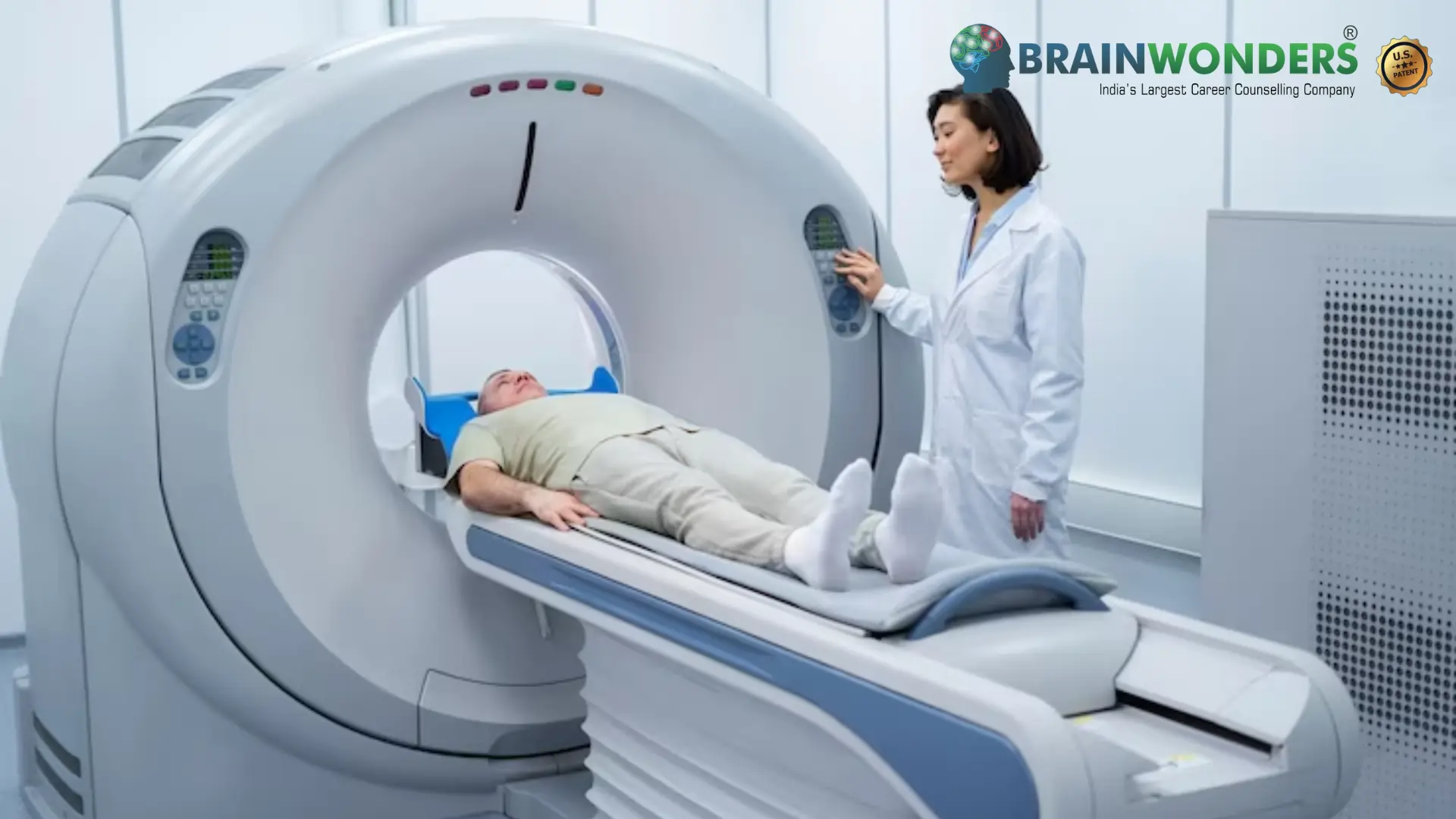Diploma in Radiology Therapy (D.M.R.T.) - Course, Fees, Eligibility, Top Colleges, Top Careers
Course Description
Diploma in Radiology Therapy (D.M.R.T.) focuses on treatment using Radiations techniques such as Chemo Therapy, Radio Therapy etc. This course is well suited for those students who want to work as a Radiotherapy Technician and are interested in helping people with lethal diseases. Students who wish to apply theoretical knowledge to various fields of Biology such as Anatomy, Physiology, Pathology etc. are well suited to this course.
What is the Diploma in Radiology Therapy?
The Diploma in Radiology Therapy, also known as DMRT, is a comprehensive course focusing on the Medical Science and Radio Diagnosis sector through Radiation Therapy. It is an ideal program for students who strongly desire to serve humanity and dedicate themselves to making a difference in medical science.
DMRT covers various medical techniques and authentic medical procedures to combat life-threatening diseases such as cancer, internal body injuries, and other illnesses. By enrolling in this course, students make a valuable contribution to society, particularly in advancing medical technology for the early and accurate diagnosis of deadly diseases like cancer.
Throughout the course, students gain a deep understanding of Radiology Therapy's practical and theoretical aspects, learning various diagnostic procedures approved by Radiologists and Radiotherapy Physicians. The curriculum covers diverse areas of Radiology, including Biology, Anatomy, Physiology, and Pathology. This comprehensive education equips students with the knowledge and skills needed to make a meaningful impact in Radiology Therapy and ultimately contribute to improving healthcare for mankind.
Reasons to pursue a Diploma in Radiology Therapy (D.M.R.T.)
Pursuing a Diploma in Radiology Therapy (D.M.R.T.) can be a compelling choice for several reasons:
- Growing Demand: With the increasing prevalence of cancer and other medical conditions requiring radiation therapy, there is a rising demand for skilled professionals in radiology therapy. Completing a D.M.R.T. program opens up numerous job opportunities in hospitals, cancer centres, and healthcare facilities.
- Vital Role in Cancer Treatment: Radiology therapists play a crucial role in cancer treatment by administering radiation therapy to target and destroy cancer cells. They work alongside oncologists and radiation oncologists to develop and execute personalized patient treatment plans.
- Specialized Skills: The D.M.R.T. program provides specialized training in radiation therapy techniques, treatment planning, and the safe operation of advanced radiation equipment. Graduates have the knowledge and skills to deliver precise and effective radiation therapy to patients.
- Patient Care and Support: Radiology therapists work closely with patients throughout their treatment journey, providing emotional support, addressing concerns, and ensuring their comfort during radiation sessions. This patient interaction allows for a sense of fulfilment in positively impacting patients' lives.
- Technological Advancements: The field of radiology therapy is continually evolving with advancements in technology and treatment modalities. Pursuing a diploma in this field lets professionals stay updated with the latest trends and technological innovations.
- Career Progression: Completing a D.M.R.T. program can be a stepping stone for further career growth. Some individuals may pursue higher education and certifications in radiation oncology or related fields, leading to specialized roles and increased responsibilities.
- Impactful Healthcare Career: Being a radiology therapist involves contributing to cancer treatment and aiding patients in their battle against the disease. This impactful role in healthcare can bring a sense of purpose and satisfaction to individuals passionate about making a difference in people's lives.
- Multidisciplinary Collaboration: Radiology therapists work collaboratively with a team of healthcare professionals, including radiation oncologists, medical physicists, and dosimetrists. This collaborative environment fosters learning, skill enhancement, and professional growth.
- Job Stability: The healthcare industry offers relatively stable employment opportunities, and radiology therapists are in demand across various healthcare settings. This can provide job security and stability in one's career.
Why Choose the Diploma in Radiology Therapy?
The Diploma in Radiology Therapy (DMRT) presents numerous advantages and opportunities for personal growth within the medical field. Below are key points highlighting the significance of undertaking this course:
- Ideal for Aspiring Medical Professionals: For students with a passion for Medical Science, particularly in Radiology Diagnosis, DMRT offers an ideal platform to realize their ambitions and contribute to the field.
- Diverse Skill Development: Pursuing this course equips students with a diverse set of skills, including visualization, analytical prowess, medical expertise, diagnosis abilities, technical proficiency, decision-making aptitude, and sound judgment.
- Combatting Deadly Diseases: DMRT empowers students with a deep understanding of various medical techniques and critical procedures essential in the battle against life-threatening diseases like cancer.
- Comprehensive Diagnosis Techniques: Students gain valuable insights into different diagnostic techniques radiotherapists employ to treat internal injuries and ailments in patients effectively.
- Lucrative Salary Packages: DMRT opens up rewarding career prospects upon completion, offering attractive salary packages ranging from INR 2,00,000 to 6,00,000 or even higher.
Typical day at work
Frequently Asked Questions
1. What is the scope of the Diploma in Radiotherapy?
Answer: The scope of the Diploma in Radiotherapy is promising and wide-ranging. Graduates of this program find opportunities to work in various healthcare settings, including hospitals, cancer treatment centres, diagnostic centres, and research institutions. As skilled radiotherapy technicians, they play a crucial role in assisting radiation oncologists and radiologists in treating and diagnosing cancer and other medical conditions. With the rising prevalence of cancer and the increasing demand for advanced medical technology, professionals with expertise in radiotherapy are in high demand, making this diploma a rewarding choice for those interested in medical science.
2. What is the future scope of a Diploma in Radiology?
Answer: The future scope of a Diploma in Radiology is quite promising and diverse. Radiology has become indispensable in modern medical practice, and qualified radiology technicians are in constant demand. Graduates can pursue careers in hospitals, diagnostic centres, imaging clinics, and medical research facilities. As technology advances, the demand for skilled radiology professionals who can operate and maintain sophisticated imaging equipment is expected to grow. Additionally, there are opportunities for specialization in various areas within radiology, such as MRI, CT scanning, ultrasound, and interventional radiology, providing even more avenues for career growth and advancement.
3. What is the qualification for DMRT?
Answer: The qualification for DMRT (Diploma in Medical Radiotherapy Technology) typically requires candidates to have completed their 10+2 education with a background in science. Most colleges and institutions offering this diploma program expect candidates to have passed their Class 12 exams with a minimum specified percentage in relevant subjects such as Physics, Chemistry, and Biology. Some institutions may also conduct entrance exams for admission to the DMRT course, and candidates need to meet the eligibility criteria set by the respective college or university.
4. What is the salary for a diploma in radiology in India?
Answer: The salary of a radiology graduate in India can vary depending on factors such as experience, location, and the employing institution. A diploma radiology technician can earn a starting salary ranging from INR 15,000 to INR 30,000 per month. With experience and expertise, the salary can increase, and senior technicians may earn between INR 40,000 to INR 60,000 or more per month. It is important to note that salaries may differ based on the specific organization and the state of employment.
5. Is radiotherapy a good course?
Answer: Yes, radiotherapy is considered a good course for individuals interested in the medical field who want to impact patients' lives positively. The field of radiotherapy plays a crucial role in the diagnosis and treatment of cancer and other medical conditions using radiation technology. As the prevalence of cancer continues to rise, the demand for skilled professionals in this field is expected to grow. Pursuing a radiotherapy course can lead to fulfilling and rewarding careers in the healthcare sector, providing opportunities to work in hospitals, cancer treatment centres, research facilities, and other medical institutions.
Eligibilty
The candidate should have completed Class 10+2 or equivalent in relevant discipline from a recognised board with 50% marks in aggregate. Admission to this course will be done based on Merit in Class 12 examination. Some colleges also conduct entrance test for admission to this course.
Admission Process for the Diploma in Radiology Therapy
The admission to the Diploma in Radiology Therapy course is based on the candidate's performance in the qualifying examination, typically the Class 12 exams. The selection process is merit-based, where the marks obtained by the candidate in the qualifying examinations play a crucial role in securing admission to the course. Below are the various steps involved in the admission process:
- Registration: Annually, colleges announce the opening of registration dates well in advance. Prospective students must register online by creating a profile on the college's website or admission portal.
- Filling up the Application Form: Once the profile is created, applicants can log in and initiate the application process. They must fill out the application form, providing details about their educational background, work experience (if any), internships, and completed projects.
- Scan and Upload Documents: Applicants must scan and upload essential documents such as mark sheets, photographs, signatures, and transfer certificates through the online portal. It is crucial to ensure that all documents adhere to the specified format and size to be accepted.
- Application Fee: A nominal application fee must be paid to process the application. Payment can be made using various online payment methods.
- Admission Decision: Colleges usually take a few weeks to process the applications after completing the application submission. Candidates who meet the cut-off marks and all other criteria receive an offer letter for admission.
Diploma in Radiology Therapy: Entrance Exams and Admission Process
Entrance Exams for DMRT Course:
A limited number of colleges conduct entrance exams for admission to the Diploma in Radiology Therapy (DMRT) course. These exams typically have 2 to 3 hours and consist of objective-type questions. The examination details, including the exam date and syllabus, are released by the colleges annually.
Preparing for the Entrance Exams:
Candidates aiming to excel in the DMRT entrance exams can follow these essential preparation tips:
- Familiarize with the Syllabus: Thoroughly review the course syllabus and identify the crucial topics to focus on during your preparation.
- Revise Important Topics: Prioritize revision of the significant topics outlined in the syllabus. Practice solving questions related to these essential subjects.
- Solve Previous Year's Question Papers: Enhance your exam readiness by solving previous years' question papers. This will familiarize you with the exam pattern and improve your speed, especially as the test is online.
- Take Mock Tests: Boost your efficiency and confidence with online mock tests on the official website. These simulated exams help you gauge your preparedness and identify areas for improvement.
How to Get Admission to a DMRT College:
To secure admission to a top-ranked Diploma in Radiology Therapy college, consider the following tips:
- Admission Process: Understand that admission can be either entrance-based or merit-based, depending on the college's criteria.
- Focus on Academic Performance: For merit-based selection, strive to achieve high percentages in your higher secondary schooling, significantly impacting your admission chances.
- Excel in Entrance Tests: In the case of entrance-based selection, perform exceptionally well and aim to score above the qualifying marks to enhance your chances of admission.
- Understand Exam Pattern: Be well-versed with the latest exam pattern and w
Colleges


